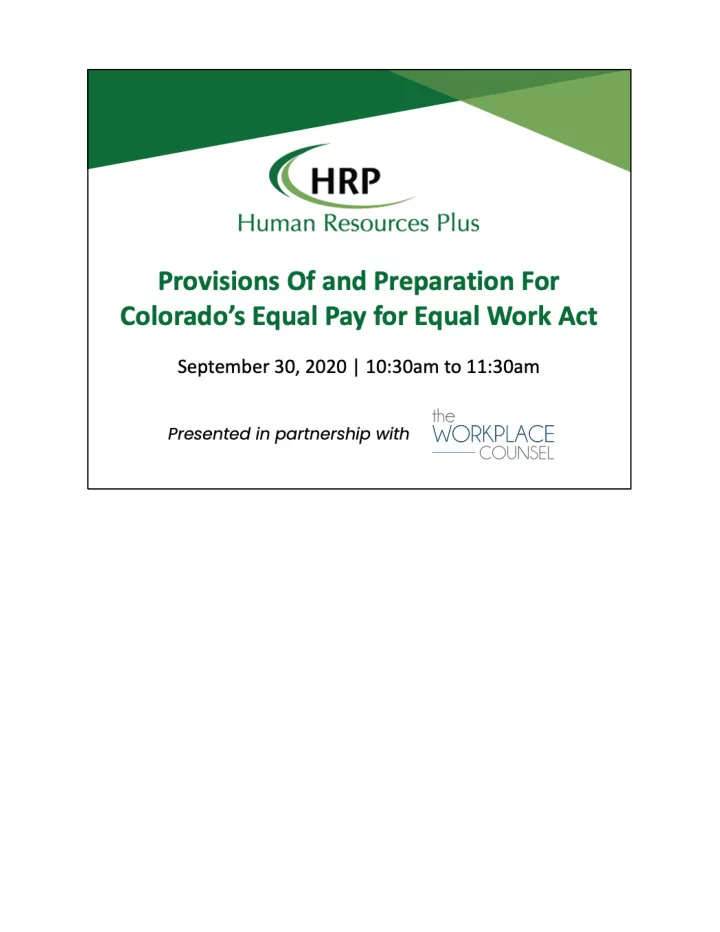

Why did Colorado’s general assembly pass this law?
Note: Education, training, or experience to the extent that they are reasonably related to the work in question. For example: • It would be reasonable to pay a teacher a higher wage if they received a Master’s degree in Early Childhood Education. • It would probably not be reasonable to pay a Marketing Specialist a higher wage if they received a Master’s degree in Biology
This is an example of an acceptable pay disparity. Maintenance Tech B earns $4 more an hour, which can be explained by his seniority, higher performance evaluations, lack of disciplinary action, and education/training that is directly related to the work performed (HVAC certification).
This is an example of a concerning pay disparity. Sales Manager A earns a lower annual salary despite their seniority, higher performance evaluations, and education in a related field (business management).
If Employee B’s supervisor was asked to explain the higher wage, they might say something like this: “When Employee B was hired it was a tough labor market – there were few qualified candidates interested in the role! Employee B negotiated for a higher wage than was originally offered. We were desperate to fill the role, so I accepted their offer!” Under Equal Pay for Equal Work, the labor market when hired and a candidate’s ability to negotiate for a higher wage are not acceptable factors for a pay disparity between two employees doing similar work. Wage differentials must be tied to the 6 acceptable factors.
Civil action - no later than 2 years after a violation; A violation occurs each time a discriminatory wage rate is paid or an individual is otherwise affected by wage discrimination. The CDOL is authorized to adopt and administer a process to accept and mediate complaints, and provide legal resources concerning alleged violations of CRS 8-5-102. The process created and administered by the CDOL will not affect or prevent an aggrieved person from filing a civil action Economic damages can include up to 3 years of back pay (the wage differential) Liquidated damages are double the economic damages Mitigation (good faith defense): In determining whether the employer’s violation was in good faith, the fact finder may consider evidence that within two years prior to the date of the commencement of the civil action that the employer completed a
thorough and comprehensive pay audit of its workforce, with the specific goal of identifying and remedying unlawful pay disparities.” An employer who violates any provision is liable for: - Legal and equitable relief, which may include employment, reinstatement, promotion, pay increase - The employee’s reasonable costs, including attorney fees
Under Equal Pay for Equal Work, even if you have a specific employee in mind, you must make known the advancement opportunity to all employees on the same day. How will organizations define a “reasonable” period for posting a promotion or job vacancy? What will be acceptable in the eyes of the courts?
Fines range from $500-10,000 per violation. Employers who choose not to disclose the pay rate for a highly-compensation position risk a fine from the CDOL of $500- 10,000. The violation may also be discovered and used in a civil proceeding to show a lack of good faith.
If an employee brings a lawsuit for unequal pay, and can demonstrate a violation of the job posting or recordkeeping requirements, the court can enter a rebuttable presumption that the records contained information favorable to the employee’s claim OR an adverse inference instruction to the jury that the failure to keep records can be considered evidence that the wage rate violation was not made in good faith. Employees can file a complaint with the CDOL for recordkeeping violations.
Conducting a compensation audit and remedying pay disparities can reduce an employer’s potential liability, as it shows a good faith effort to provide equitable wages.
• Essential duties and responsibilities – allows you to compare employees doing similar work, despite job titles • KSAs – provides criteria for performance review and merit evaluations • Education/training/experience – provides written documentation for qualifications relevant to the role • Special circumstances – provides written documentation to justify pay discrepancies based on acceptable criteria • Comp and benefits – required under EPEW
Recommend
More recommend